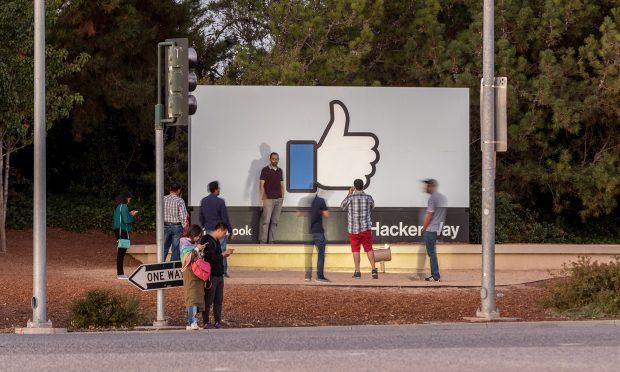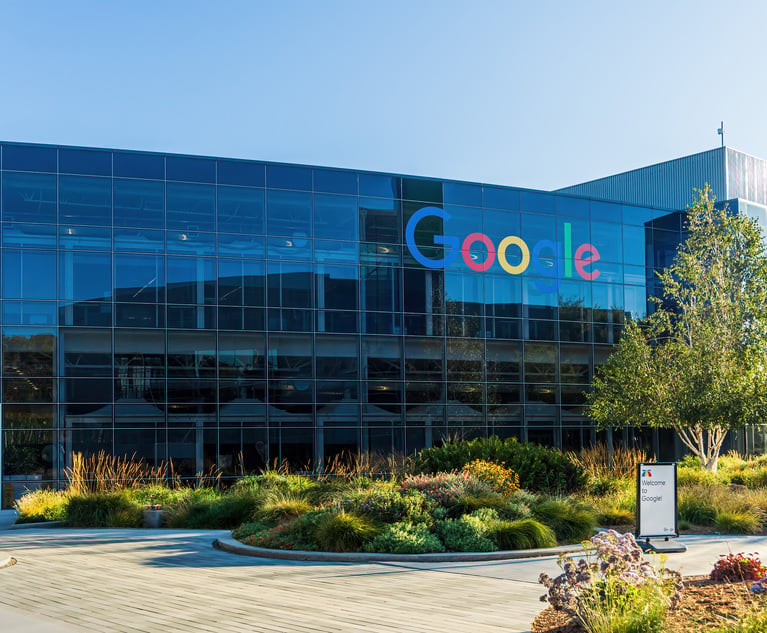Facebook Agrees to Change Ad Platform to Settle Discrimination Claims
As a result of the settlement, anyone seeking to place housing, employment or credit ads on Facebook will no longer be allowed to target consumers based on their age, gender or ZIP code.
March 19, 2019 at 03:21 PM
5 minute read
 Headquarters for social networking company Facebook Inc. in Menlo Park, California. (Photo: Jason Doiy/ALM)
Headquarters for social networking company Facebook Inc. in Menlo Park, California. (Photo: Jason Doiy/ALM)
In a settlement with civil rights and labor groups, Facebook Inc. announced sweeping changes to its ad platform Tuesday to resolve claims that advertisers for housing, employment and credit opportunities targeted the website's audiences in a discriminatory basis.
The social media giant announced the settlement Tuesday, rolling out changes to how it manages housing, employment and credit ads on its website. The settlement, which will prohibit advertisers from excluding users on a discriminatory basis, was filed in the U.S. District Court for the Southern District of New York.
Facebook reached the settlement after it faced mounting legal pressure from a coalition of civil rights and labor groups and plaintiffs firms. Facebook agreed to work with the groups to monitor implementation of the changes.
The settlement came together after months of negotiations, which began in the spring of 2017 and will resolve at least five lawsuits filed by groups including the American Civil Liberties Union, Communications Workers of America, and the National Fair Housing Alliance.
“Today's changes mark an important step in our broader effort to prevent discrimination and promote fairness and inclusion on Facebook. But our work is far from over,” said Facebook chief operating officer Sheryl Sandberg in a statement.
Facebook's key structural change will be creating a separate portal for advertisers hoping to publish housing, employment, credit advertisements, or HEC, on Facebook, Instagram or Messenger. The tech giant will significantly limit those advertisers' targeting options, eliminating their ability to select audiences based on gender, age, race, religion and sexual orientation. Advertisers will be barred from targeting other groups who are protected under federal, state or local laws.
The platform has also agreed to eliminate ZIP code targeting and will establish a minimum geographic radius of 15 miles from a specific address or the center of a city.
The targeting options will go “down from tens of thousands to just a few hundred,” Galen Sherwin, an ACLU attorney, said during a press call.
Under these changes, advertisers will be asked at the outset to self-certify whether they're HEC ad creators. If they are, then they will work through the HEC portal, which will limit their set of targeting options. If Facebook detects an HEC advertiser has tried to evade that portal, then the platform will block the advertisement and re-route them to the HEC portal.
Facebook also will begin requiring advertisers to certify their compliance with anti-discrimination laws and Facebook's own anti-discrimination policies, Sherwin said.
The National Fair Housing Alliance is represented by New York-based civil rights firm Emery Celli Brinckerhoff & Abady. The Communication Workers of America and several individual job-seekers are represented by Outten & Golden and the ACLU.
As part of the deal, Facebook will pay nearly $3 million to CWA to reimburse its legal fees and costs and to the individual who alleged they were denied opportunities on Facebook's ad platform.
Facebook also agreed to pay the NFHA up to $1,950,000, in damages and attorneys' fees.
'Wonderful Settlement'
Facebook has faced scrutiny over its ads since ProPublica first published a story in October 2016 that detailed how the company had allowed advertisers to target users based on race. ProPublica showed that it was possible to purchase housing-related advertisements and target them for certain races, excluding Facebook users with certain “ethnic affinities.”
Facebook was subsequently hit with at least five discrimination lawsuits or charges filed with the Equal Employment Opportunity Commission between 2016 and 2018. Attorneys at the Aqua Terra Aeris Law Group and the Law Office of William Most led the way with a lawsuit in the Northern District of California in 2016, representing plaintiffs who said Facebook had allowed ad-purchasers to discriminate against racial minorities.
Outten Golden was brought onto the suit later in 2016 and it began asserting claims on a classwide basis. Facebook initially filed a motion to dismiss, which Outten Golden opposed.
Settlement talks began in spring 2017, said Jahan Sagafi, a civil rights attorney at Outten Golden.
“Those talks have continued through this week and ultimately culminated in the wonderful settlement,” Sagafi said. He described it as a “global settlement” that resolves the California case, as well as four other cases related to gender, age, and the housing discrimination claims.
David Berman, an Emery Celli Brinckerhoff & Abady attorney, said the firm began settlement talks with Facebook in September. He said that, given the way advertising has evolved, settlements like this were important for ensuring that laws protecting certain groups are “updated to fit the new age.”
This content has been archived. It is available through our partners, LexisNexis® and Bloomberg Law.
To view this content, please continue to their sites.
Not a Lexis Subscriber?
Subscribe Now
Not a Bloomberg Law Subscriber?
Subscribe Now
NOT FOR REPRINT
© 2025 ALM Global, LLC, All Rights Reserved. Request academic re-use from www.copyright.com. All other uses, submit a request to [email protected]. For more information visit Asset & Logo Licensing.
You Might Like
View All
How We Won: BraunHagey’s $56M Trademark Win Over Molson Coors Upheld by 9th Circuit
8 minute read
'Water Cooler Discussions': US Judge Questions DOJ Request in Google Search Case
3 minute read
Judge to Hear Arguments on Whether Google's Advertising Tech Constitutes a Monopoly
3 minute readTrending Stories
- 1Judges Split Over Whether Indigent Prisoners Bringing Suit Must Each Pay Filing Fee
- 2Law Firms Report Wide Growth, Successful Billing Rate Increases and Less Merger Interest
- 3CLOs Face Mounting Pressure as Risks Mushroom and Job Duties Expand
- 4X Faces Intense Scrutiny as EU Investigation Races to Conclusion & Looming Court Battle
- 5'Nation Is in Trouble': NY Lawmakers Advance Bill to Set Parameters for Shielding Juror IDs in Criminal Matters
Who Got The Work
J. Brugh Lower of Gibbons has entered an appearance for industrial equipment supplier Devco Corporation in a pending trademark infringement lawsuit. The suit, accusing the defendant of selling knock-off Graco products, was filed Dec. 18 in New Jersey District Court by Rivkin Radler on behalf of Graco Inc. and Graco Minnesota. The case, assigned to U.S. District Judge Zahid N. Quraishi, is 3:24-cv-11294, Graco Inc. et al v. Devco Corporation.
Who Got The Work
Rebecca Maller-Stein and Kent A. Yalowitz of Arnold & Porter Kaye Scholer have entered their appearances for Hanaco Venture Capital and its executives, Lior Prosor and David Frankel, in a pending securities lawsuit. The action, filed on Dec. 24 in New York Southern District Court by Zell, Aron & Co. on behalf of Goldeneye Advisors, accuses the defendants of negligently and fraudulently managing the plaintiff's $1 million investment. The case, assigned to U.S. District Judge Vernon S. Broderick, is 1:24-cv-09918, Goldeneye Advisors, LLC v. Hanaco Venture Capital, Ltd. et al.
Who Got The Work
Attorneys from A&O Shearman has stepped in as defense counsel for Toronto-Dominion Bank and other defendants in a pending securities class action. The suit, filed Dec. 11 in New York Southern District Court by Bleichmar Fonti & Auld, accuses the defendants of concealing the bank's 'pervasive' deficiencies in regards to its compliance with the Bank Secrecy Act and the quality of its anti-money laundering controls. The case, assigned to U.S. District Judge Arun Subramanian, is 1:24-cv-09445, Gonzalez v. The Toronto-Dominion Bank et al.
Who Got The Work
Crown Castle International, a Pennsylvania company providing shared communications infrastructure, has turned to Luke D. Wolf of Gordon Rees Scully Mansukhani to fend off a pending breach-of-contract lawsuit. The court action, filed Nov. 25 in Michigan Eastern District Court by Hooper Hathaway PC on behalf of The Town Residences LLC, accuses Crown Castle of failing to transfer approximately $30,000 in utility payments from T-Mobile in breach of a roof-top lease and assignment agreement. The case, assigned to U.S. District Judge Susan K. Declercq, is 2:24-cv-13131, The Town Residences LLC v. T-Mobile US, Inc. et al.
Who Got The Work
Wilfred P. Coronato and Daniel M. Schwartz of McCarter & English have stepped in as defense counsel to Electrolux Home Products Inc. in a pending product liability lawsuit. The court action, filed Nov. 26 in New York Eastern District Court by Poulos Lopiccolo PC and Nagel Rice LLP on behalf of David Stern, alleges that the defendant's refrigerators’ drawers and shelving repeatedly break and fall apart within months after purchase. The case, assigned to U.S. District Judge Joan M. Azrack, is 2:24-cv-08204, Stern v. Electrolux Home Products, Inc.
Featured Firms
Law Offices of Gary Martin Hays & Associates, P.C.
(470) 294-1674
Law Offices of Mark E. Salomone
(857) 444-6468
Smith & Hassler
(713) 739-1250







